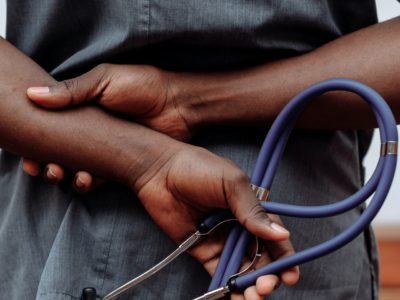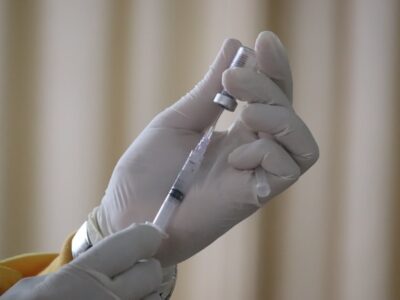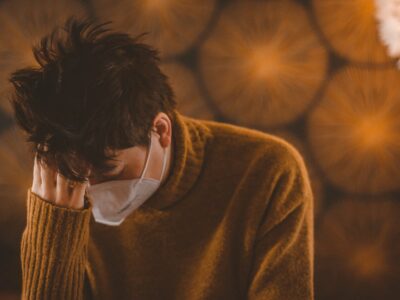Michael Odell was a young ICU nurse that traveled around to hospitals in need during the pandemic. In the early days of 2020, he sensed that the virus and massive death toll to come would have a devastating effect on healthcare workers.
He was one of many providers suffering from post-traumatic stress disorder (PTSD) after watching countless patients die alone in their rooms. After struggling with bouts of depression, Odell took his own life earlier this year. Now, his family and friends are speaking out about what could’ve been done to prevent this tragedy.
Posting from the Frontlines
Odell started his career early by most standards. He graduated from nursing school at 20 and soon started working in the field as a travel nurse. His family and friends say that he got into healthcare because he cared deeply about others. He was also fluent in Spanish and loved speaking the language with his patients. Traveling gave him the opportunity to make more money during the pandemic while making new friends along the way.
But life on the road started to take its toll. Odell posted regularly on Facebook about his experiences.
“I am already feeling the emotional burnout of caring for patients who, despite some being the sickest they’ve ever been, are unable to have their loved ones by them,” Odell wrote at the time. “What do you say to someone who is facing death and can’t have their loved ones with them?”
He would often stand alone in the room, acting as a surrogate for the patient’s family and friends during their last moments on earth.
“I feel for them as deep as human empathy can allow,” Odell wrote about his COVID-19 patients in April 2020, “but I fear the long-term effects this may have on every clinical worker navigating this pandemic and in these situations. Please don’t think me selfish; I get that my level of ‘suffering’ cannot compare to what these patients and their families are experiencing. But the fact is that I have an amazing support system and people who love me and tell me frequently that they do; I fear for those who do not.”
Later that month, Odell tried to take his own life. He was working at a hospital in the Bay Area at the time, but his then-boyfriend was living in Minnesota, which only added to the isolation.
He described nursing as “death after death after death,” according to his friend and fellow nurse Michael Walujo.
Soon after, Odell told his brother Brad that he stopped caring about things. While back home in Minnesota, he started taking antidepressants and seeing a therapist and psychiatric nurse practitioner.
He moved back to San Francisco for a time before taking a contract at Stanford just as the Omicron surge hit last December.
Odell and his colleagues started hosting “Wellness Wednesdays” to check in on each other.
The other nurses noticed that Odell was sleeping more during this time, but they just assumed it was because he was working so much.
On January 18, Odell walked out of his shift abruptly after telling the other nurses that he was grabbing something from his car. The police later found his vehicle off the side of the road near the hospital. His body was found two days later in a nearby wildlife refuge. Odell died of apparent suicide.
His family and friends have been trying to piece together what happened during those final hours. They say nothing out of the ordinary seemed to happen during the shift. Surveillance footage shows that Odell left the building at 4:30 AM but didn’t leave the parking lot until 7:30 AM.
They wonder if Odell was waiting for someone to come and check on him.
The Risk of Suicide
Suicides can’t be explained easily. There may have been other factors at play beyond what Odell was dealing with at work.
But studies show that nurses and other frontline workers had a higher risk of suicide compared to the general population even before the pandemic.
Working alone under layers of PPE only makes the problem worse.
“Having to take the role of the family while also trying to keep some distance so you don’t break every time, that can make the brunt of each death harder,” said Jessi Gold, a psychiatrist at Washington University in St. Louis who specializes in health care worker mental health.
David Hernandez, an associate nurse advocate with the Stanford’s nurses’ union, said facilities should have a plan in place if one of their workers suddenly disappears mid shift and that it shouldn’t be up to other nurses to go looking for one of their own. He said that Stanford has yet to implement such a policy and that the other nurses have started sharing their license plates in case they go missing.
“The nurses have figured out that we have to come up with a system on our own,” said Hernandez, who works in the emergency department.
Stanford responded to Odell’s death by saying that the hospital is “committed to providing a full complement of mental health and wellness benefits,” and is “continually updating our policies and procedures to support our employee’s physical and mental well-being.”
“While Michael Odell, a traveling nurse, was with Stanford Health Care for one month, he was a valued member of our community,” the statement said. “We are deeply saddened and mourn this loss, as do those who worked alongside him.”
Odell’s family and friends have been sharing his story to help other nurses that are struggling with their mental health during this difficult time.
“I would gladly have him care for any one of my family, loved ones, because I know they would be in good hands, because he was just that good of a nurse,” said Walujo during Odell’s vigil. “And he advocated for you, regardless of what.
“And above all, Michael Odell made you feel seen,” Walujo continued. “He genuinely made you feel seen. He made you feel important. He made you feel that you mattered, and we do matter.”
If you or someone you know is considering suicide, contact the National Suicide Prevention Lifeline at 1-800-273-8255 (Español: 1-888-628-9454; deaf and hard of hearing: 1-800-799-4889) or the Crisis Text Line by texting HOME to 741741.
















